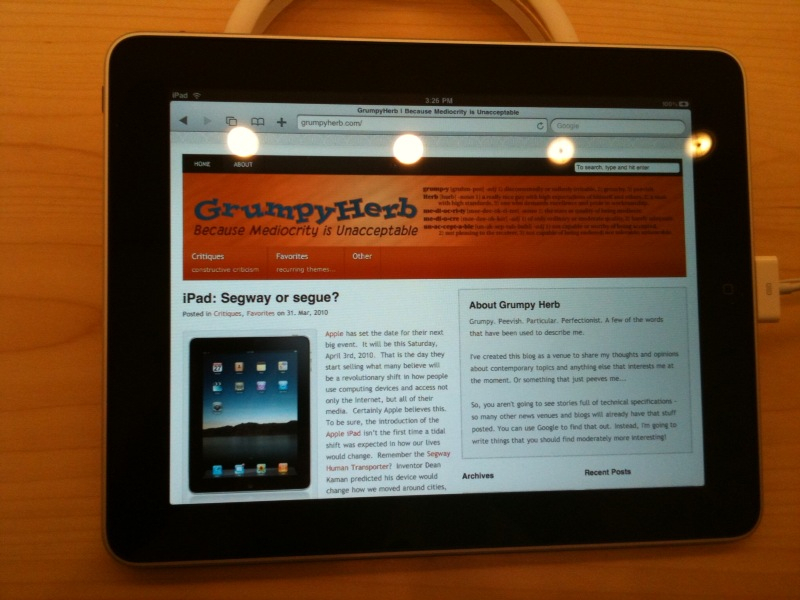Number One
/Mark your calendars: The iPhone is coming to Verizon on January 11, 2011

Just last night, I was visiting with a close friend and lamenting the fact that it didn’t look like Apple was going to be releasing the iPhone for Verizon on January 11th, the most perfect day possible for such an announcement. He was sitting by his computer, and happened to look at his browser, and said, “oh, wait… there’s news here on the CBS web site about a Verizon announcement next Tuesday.” That was it! It appears that no mention of this news was published (anywhere) until markets closed in New York on Friday; unusual for Apple who normally gives reporters at least a full weeks notice for such (premiere) press events.
I pulled open my laptop, and started searching through my Apple news bookmarks to read more details. The press was already in a feeding frenzy!
There were so many reasons why Apple should pick this day, it should have been obvious to everyone in the tech press. But as early as the start of CES in Vegas earlier this week, there was no rumor buzz. Then, a glimmer of speculation started when Verizon announced that they would hold a press conference on Thursday (Jan 6) at CES. But all they announced were some Android phones and 4G network rollouts. That should have excited everyone, but it wasn’t the announcement that everyone was waiting for, so it didn’t generate the fanfare one might normally expect.
So, why should this have been obvious?
Number 1: Apple is bringing the number one phone to the number one US cell phone network. On January 11th, 2011 at 11am. Could the use of the digit “1” be any more obvious?! This is a one-time-only marketing opportunity, and Apple couldn’t miss it.
Number 2: Apple has virtually stopped going to trade shows, from MacWorld to Consumer Electronics Show in Las Vegas (CES). They are big enough to create their own media events, and they don’t mind up-staging other events. The timing of an event like this just days after CES makes perfect sense by this measure.
Number 3: The tech press has been reporting this eventuality for months; detailing shipments of CDMA chipsets to Apple last fall and countless other rumors that the iPhone was coming to Verizon soon. Some recent rumors suggested Valentines Day.
Number 4: The exclusive deal with AT&T couldn’t last forever. Apple wasn’t going to wait until November 11th later this year to hit the ultimate 11/11/11 trifecta. Instead, they are picking the “first” month of the year to be on the number one network with the number one phone. It seems so obvious.
Number 5: Competition from Android is driving this as well. Android is the best thing that has happened to the modern smartphone marketplace. Feature comparisons exist everywhere, and both camps have their supporters and detractors. As a result of the sheer volume of Android phones from multiple vendors continues to increase, and as consumers continue upgrading to smart phones, Apple will not have the “number one phone” forever even though they do now (see link for November 2010 charts and graphs). That doesn’t mean the iPhone isn’t a great phone; rather it means that they will soon lose the marketing hyperbole that they can use this month.
Also keep in mind that the Verizon excitement (and related technology) is a mostly USA phenomenon only. Most of the rest of the world uses the same GSM network technology used by AT&T, and that will drive the majority of iPhone sales. The CDMA technology used by Verizon in the USA is used in very few other countries, so the sales spike for Apple will be largely limited to US shipments.
How many Verizon iPhones will be sold? Deutsche Bank Telecom Services analyst Brett Feldman estimates “that Verizon will add roughly 15M iPhones in 2011 with 6M cannibalized from AT&T.”
I guess the only surprise in this is that Verizon is making the announcement instead of Apple. I’m guessing that this is a move by Apple to placate their original vendor, AT&T.
As for me, I’m probably sticking with AT&T. The network is only going to get better once they lose 10-20% of their smart phone users to Verizon. In 17 months with AT&T, I’ve only had two dropped calls. And my local signal strength from AT&T exceeds what I had with Verizon before I switched to the iPhone in July 2009. Unless Verizon offers unlimited data plans at much lower prices than AT&T and actually tries to heat up the cell phone marketplace by sparking rate competition or matching Sprint’s package price points, I’ll be waiting until the iPhone 5 comes out this summer to decide when and with whom I should upgrade. My 3GS with no front-facing camera continues to work just fine for me!

